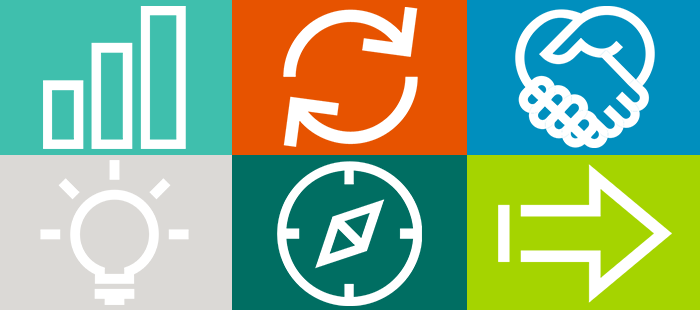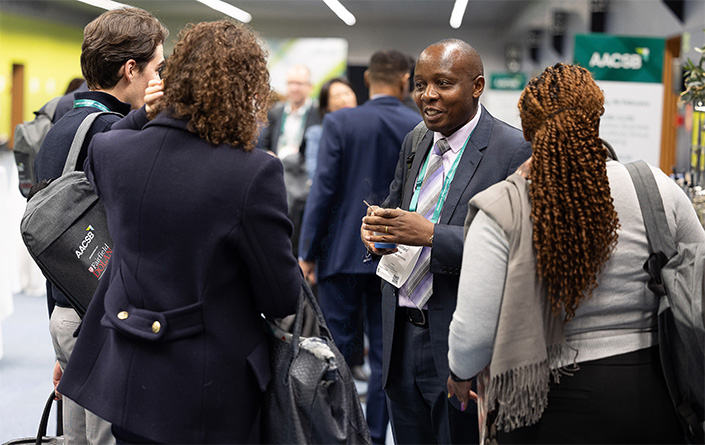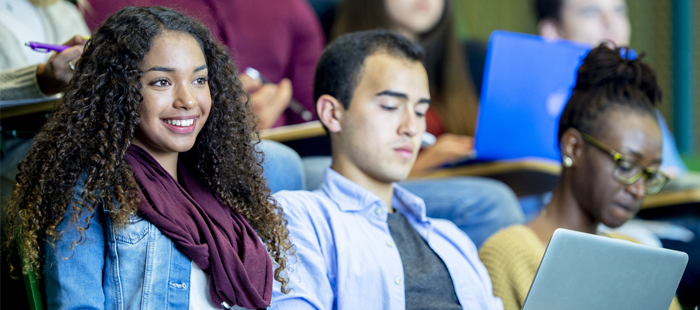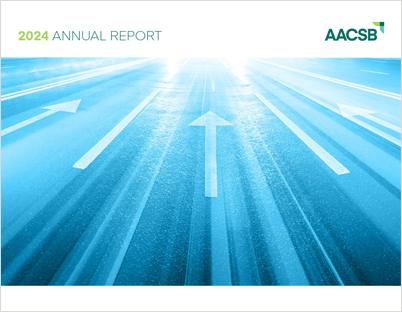Presidents Panel: Leading Beyond COVID-19 in Higher Education
We are in a moment of deep uncertainty. Higher education has arguably transformed faster in the past several months than it has in the past several years, out of sheer necessity. Leaders are being tested on the very tenets that business educators have been preaching for years—adaptability, agility, flexibility. Despite these teachings, so many questions still remain for higher ed leaders about how to move forward while meeting both the safety and educational needs of learners. These extraordinary times call for extraordinary leadership.
We are fortunate to have three highly accomplished leaders to turn to with questions about how they are handling the many challenges brought about by COVID-19. The following three college and university presidents were each business school deans prior to entering their current positions, and as such are in the unique position of understanding the larger institutional needs as well as the ways in which business schools can be a part of the solution during this crisis.
About the Panel
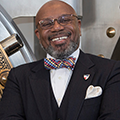 Miles K. Davis is the president of Linfield College, a private liberal arts college in McMinnville, Oregon. He previously served as dean of the Harry F. Byrd Jr. School of Business at Shenandoah University in Virginia, where he also held other teaching and administrative roles since 2001. Davis is the first business school dean, and now the first college president, to have graduated from The PhD Project, an organization (and AACSB strategic partner) that helps increase underrepresented faculty in U.S. business schools. Miles K. Davis is the president of Linfield College, a private liberal arts college in McMinnville, Oregon. He previously served as dean of the Harry F. Byrd Jr. School of Business at Shenandoah University in Virginia, where he also held other teaching and administrative roles since 2001. Davis is the first business school dean, and now the first college president, to have graduated from The PhD Project, an organization (and AACSB strategic partner) that helps increase underrepresented faculty in U.S. business schools.
|
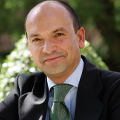 Santiago Iñiguez is the executive president of IE University in Madrid, an institution that boasts a highly international student body, with more than 75 percent of students coming from outside of Spain. He is the former dean of IE Business School at the same institution, where he began as a professor in1991 and later became director of external relations prior to becoming dean. Iñiguez also served as chair of AACSB’s board of directors in 2016 and was the first non-U.S. dean to hold the position. Santiago Iñiguez is the executive president of IE University in Madrid, an institution that boasts a highly international student body, with more than 75 percent of students coming from outside of Spain. He is the former dean of IE Business School at the same institution, where he began as a professor in1991 and later became director of external relations prior to becoming dean. Iñiguez also served as chair of AACSB’s board of directors in 2016 and was the first non-U.S. dean to hold the position. |
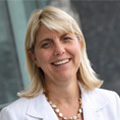 Linda Livingstone is the president of Baylor University, a private Christian institution in Waco, Texas. She previously served two stints as dean—at Pepperdine University’s Graziadio School of Business and Management, and then at The George Washington University School of Business—prior to transitioning to Baylor, where she would become the university’s first woman president. Livingstone also served as the 2014-15 board chair of AACSB and has contributed in other significant service roles. Linda Livingstone is the president of Baylor University, a private Christian institution in Waco, Texas. She previously served two stints as dean—at Pepperdine University’s Graziadio School of Business and Management, and then at The George Washington University School of Business—prior to transitioning to Baylor, where she would become the university’s first woman president. Livingstone also served as the 2014-15 board chair of AACSB and has contributed in other significant service roles.
|
Presidents’ Perspectives
Lee Davidson: What leadership traits have most helped you guide your institution through this pandemic?
Miles K. Davis: Dealing with ambiguity, operating with flexibility, demonstrating compassion, and maintaining effective communication.
Santiago Iñiguez: Current exceptional circumstances demand all the skills associated with strong leadership: an entrepreneurial drive; formulation of a future vision, despite uncertainties and alternative scenarios; the ability to motivate people; determination; agile implementation of decisions; and, most of all, resilience.
Resilience comes through character building, the repetition of behaviors, and mental exercises. In many educational institutions, especially in military academies, resilience is drilled into students over several years. It is a quality that is useful for leaders in all fields, especially in business, and at times of extreme uncertainty, such as today’s. Entrepreneurs understand this all too well; after all, they are serial losers: triumph only comes after repeated failure. Success is simply the other face of defeat.
Linda Livingstone: There are many, but I would mention three specifically:
- Humility: I always consider humility to be important to effective leadership, but amid the pandemic I view it as critical, given how much uncertainty we face and how rapidly the situation changes. We have to be willing to acknowledge that we do not have all the answers and to listen to those who are truly experts on the issues we are facing.
- Courage: In a time of great challenge, when significant decisions are being made with limited information in very quick succession, it is important to have the courage to make those decisions, to not be paralyzed by the pressure and uncertainty. And if a decision is wrong or needs to be adjusted, we have to have the humility to acknowledge it and make the appropriate changes.
- Authentic communication: Amid the uncertainty we are all facing, there is a great deal of fear and anxiety. It is critical for leaders to communicate honestly, frequently, and in authentic ways to their various constituencies, sharing what is being done now and what is being planned for the future, while being honest about what we don’t know. The communication must also bring hope to the community—hope that we will get through this pandemic and hope that when we get to the other side, we will be stronger and better for what we and our organization experienced. We will thrive through this, not just survive.
LD: What are some key ways your institution—or higher education more broadly—will change for the long term as a result of COVID-19?
MKD: All of us in higher education will learn to move more quickly and collaboratively to adapt to changes in our environments. An increased awareness of the socioeconomic challenges of being online will cause us to consider distributive technologies—systems of technology composed of many small parts without centralized coordination or control. Within the context of higher education, we will have to consider how we use artificial intelligence, blockchain technology, internet of things, or swarm robotic systems, as a few examples.
At schools like Linfield you will see increased emphasis on community-building. Students come to Linfield for a quality educational experience, but they stay at Linfield—and want to return to Linfield—because of the sense of community. We intend to make sure we have spaces that can make that happen. Whether it’s a pop-up gathering in our famous Oak Grove or hosting a short film festival, we will intentionally engage in activities that will allow people to come together and find their tribe.
SI: IE University, and IE Business School, had been offering hybrid programs prior to the pandemic, combining face-to-face classroom sessions with high-quality online delivery formats, both synchronous and asynchronous. This experience has allowed us to smoothly switch to a hybrid format across all our programs.
The preparation, dedication, and commitment of our faculty were central to achieving this transition. I have always insisted that the key to success in any educational format is not the technology, nor the content. These are necessary components of online learning, but they quickly become commodities. Platforms may be the princess, content the queen, but the experience provided by the faculty is the empress.
LL: Very practically, we will use technology differently in the future than we have in the past. We are learning so much about technology-enabled learning, engagement of stakeholders, and remote work arrangements that will help us provide an even richer, deeper working and learning environment in the years ahead.
We are also learning how to even better focus our resources on the highest and best purposes in support of our core mission and vision. In times like this, we are reminded of what is truly important to our mission, students, faculty, staff, parents, and other constituencies, and have come to realize that we sometimes spend significant time and resources on issues that are tangential to our most important work.
Finally, the resilience, adaptability, and creativity of our community has been accentuated during this time, showing us how much opportunity we truly have when we work together to accomplish something significant for our campus.
LD: How do you think COVID-19 will impact international education in the coming semesters?
MKD: In the short term it will limit international education. In the long term we will come to realize more than ever how interconnected we are. Viruses don’t respect borders.
SI: Hybrid formats, and what we call at IE University “liquid learning,” are here to stay. Not just because social distancing and cross-border mobility pose problems for attending face-to-face classes regularly, but rather because they provide better results than traditional learning.
Flexible, adaptable, intensive, user-friendly, even entertaining: these are the hallmarks of liquid learning, combining online learning, synchronous and asynchronous, with a classroom-based approach. The advantage of liquid learning is that it can keep the learning momentum going by adapting to the circumstances of the learner. It also allows for greater interactivity with other participants.
LL: International education, both domestic students traveling internationally and international students coming to our institutions to study, will likely be very challenging in the coming semesters. International travel has been restricted in many locations around the world, and universities have put significant restrictions on travel of their faculty, staff, and students, making study abroad of all types very challenging right now.
We have made so much progress over the years in internationalizing our educational institutions and our students’ learning experiences that it will be imperative that we identify new and innovative ways to ensure that they continue to develop a global mindset, even if they are unable to travel as widely or study in settings that are as internationally diverse.
LD: What advice do you have for business school deans grappling with program deliveries, reduced enrollments, and budget reductions?
MKD: Business school deans, and their institutions, must become more collaborative to expand offerings and reduce costs. Schools will require a greater focus on what their core mission is and adapt accordingly. For example, are you primarily a research institution or primarily teaching? How is that reflected in your policies and recruitment of faculty processes? We need to think differently about what we offer and to whom it is being offered.
SI: My advice is that while they formulate different scenarios and identify the better survival avenues—which includes the importance of prudent cash flow management, diversification, cutting costs that improve productivity—they also care for other priorities that are equally important but often overlooked:
- Formulate and implement a winning strategy, beyond merely weathering the storm, that has long-term goals and is built on flexibility to adapt to changing circumstances.
- People are the main source of competitive advantage in the knowledge economy, and particularly at academic institutions. It is at times of crisis that this principle is really put to the test.
- Communicate regularly with the company’s most important stakeholders, and let them know about your collegiate decisions.
LL: Keep your mission and vision at the forefront of all decisions you make. Ensure that what you are doing to address the pandemic in the short term doesn’t cause irreparable damage to your core mission, but instead positions your school to be differentially better in the future.
It is also critical to keep your constituents engaged and informed so that they walk alongside you through this time and understand what you are doing, why you are doing it, and how it will make your school stronger so that they are still with you when you are on the other side of the pandemic.
LD: How can business schools be a part of the solution to moving beyond this pandemic?
MKD: Every business school should have information regarding the economic impact the college or university has on the local or regional economy. That information must be shared with politicians and the greater community. They have a vested interest in our survival.
SI: As Charles Darwin explained, the species that survive are not the largest or strongest, but those that are best adapted to their environment. Similarly, the business schools mostly likely to successfully overcome the COVID-19 crisis will be those that best adapt to the constantly changing context. For example, the business schools showing the greatest adaptability over the past years, entering online education, flipping their learning methods, designing their programs in conjunction with recruiters, and that were already transforming their business model before the crisis, will have more chances for success.
LL: Business schools can provide significant leadership on their campuses in a situation where innovation and entrepreneurial thinking are essential to surviving and thriving. By helping your university apply the skills you teach every day in change management, organizational design, design thinking entrepreneurship, and innovation, among others, you can help your entire university become stronger and more adaptable in the future for having gone through this crisis.
In addition, these same skills can be shared in your communities, particularly in support of the small businesses that are struggling through the economic impact of the pandemic, to help your community’s economy weather this challenging time as effectively as possible.
LD: What makes you optimistic about the post-COVID-19 future of higher education?
MKD: Students and faculty miss each other. They need each other. We are coming to understand that students are much more than consumers of a product—education—but are co-creators in their learning experience. Included in that is community-building. We are coming to understand that our individual actions have community impact.
SI: The post-COVID-19 world will embrace adaptation and change. Professionals will live blended lives, and the work environment will become increasing hybrid, and liquid, too. Professionals will work in teams both in person and on social platforms, from home or at their company offices, along a continuum that blurs distance and time and that increases productivity. They will increasingly deal virtually with colleagues from different hemispheres and time zones, making friends who belong to diverse cultures and possess different visions of the world.
Education should become liquid, accommodating these changes. This liquidity also will be reflected in the creation and distribution of knowledge, teaching methodologies, and communication in general.
LL: Universities have some of the smartest, most capable people in the world working for them. And these faculty and staff have a deep commitment to the unique educational missions of their institutions, a passion for learning, and a profound desire for finding solutions to intractable problems that enhance the quality of life for people around the world.
There is no better combination than really smart people who are passionate about what they are doing and who are deeply committed to solving important problems for ensuring a bright future for higher education.

